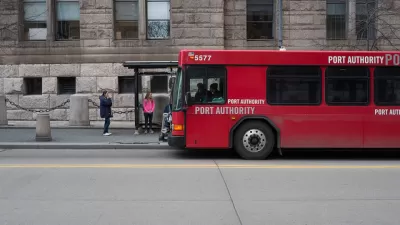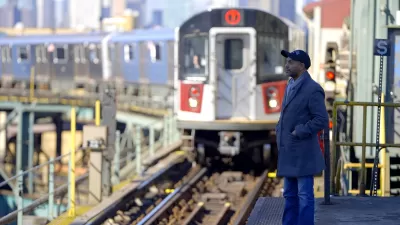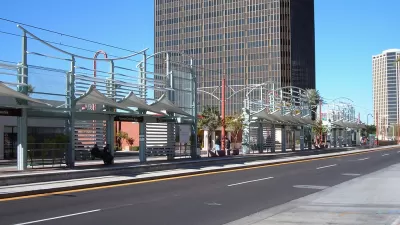2018 could finally reveal how the federal government will approach transit funding in the Trump era. Or the status quo could continue.

Yonah Freemark summarizes the state of transit funding at the beginning of 2018, noting that there is a significant gap between the Trump Administration and Congress on transit funding, but the threat that local and state agencies counting on federal support for planned, or even constructed, transit projects could end up regretting their assumptions.
According to Freemark, "Congress has largely ignored the White House’s efforts to cut funding for transit projects," and "transit agencies are acting as if grants will continue far into the future; they’re continuing to submit their projects for federal review."
That doesn't mean the status quo won't change in the future. "Indeed, Trump has yet to even submit a nominee to head the Federal Transit Administration," reports FReemark. "The FTA’s capital investment report suggested that [pdf] 'Future investments in new transit projects would be funded by the localities that use and benefit from these localized projects,' despite the government’s continued support for road projects, whose use is overwhelmingly local."
The article casts a wide net in taking the temperature of the politics of transit funding at the federal level, noting the projects that received funding in 2017 (from Minneapolis to Indianapolis and Seattle), and speaking directly with transit officials around the country about their plans in 2018. Freemark concludes by offering insight into what to expect from 2018—one key benchmark to watch is the expected release of the Trump Administration's infrastructure plan. Despite the big dollar figure attached to the plan, Freemark is skepticial it will provide the kind of support sought by transit advocates:
What we know about that proposal, however, suggests that it is unlikely to be supportive of the transit projects most cities want. The administration’s rhetoric about the plan suggests that it would emphasize selling or leasing assets to private entities (though the president himself is apparently not confident that public-private partnerships work in the first place), and fund projects that can “support themselves” through user fees, which means that it won’t do much for projects other than toll highways in dense urban areas.
For more coverage on the large issue of local funding versus federal funding for transportation investment, see a recent article by Adie Tomer and Joseph Kane.
FULL STORY: A year into the Trump Presidency, federal transit support limps along

Alabama: Trump Terminates Settlements for Black Communities Harmed By Raw Sewage
Trump deemed the landmark civil rights agreement “illegal DEI and environmental justice policy.”

Study: Maui’s Plan to Convert Vacation Rentals to Long-Term Housing Could Cause Nearly $1 Billion Economic Loss
The plan would reduce visitor accommodation by 25% resulting in 1,900 jobs lost.

Planetizen Federal Action Tracker
A weekly monitor of how Trump’s orders and actions are impacting planners and planning in America.

Waymo Gets Permission to Map SF’s Market Street
If allowed to operate on the traffic-restricted street, Waymo’s autonomous taxis would have a leg up over ride-hailing competitors — and counter the city’s efforts to grow bike and pedestrian on the thoroughfare.

Parklet Symposium Highlights the Success of Shared Spaces
Parklets got a boost during the Covid-19 pandemic, when the concept was translated to outdoor dining programs that offered restaurants a lifeline during the shutdown.

Federal Homelessness Agency Places Entire Staff on Leave
The U.S. Interagency Council on Homelessness is the only federal agency dedicated to preventing and ending homelessness.
Urban Design for Planners 1: Software Tools
This six-course series explores essential urban design concepts using open source software and equips planners with the tools they need to participate fully in the urban design process.
Planning for Universal Design
Learn the tools for implementing Universal Design in planning regulations.
Caltrans
Smith Gee Studio
Institute for Housing and Urban Development Studies (IHS)
City of Grandview
Harvard GSD Executive Education
Toledo-Lucas County Plan Commissions
Salt Lake City
NYU Wagner Graduate School of Public Service





























